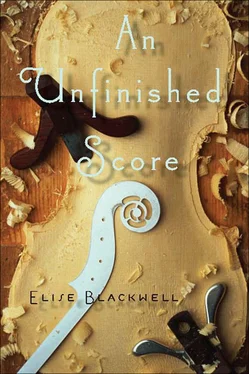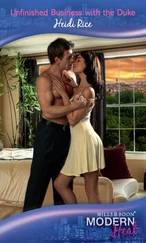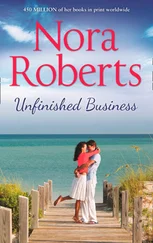“Your week will be a microcosm of the real orchestral world,” this conductor tells them. “It just gets worse from here.” He holds open his palm and sweeps his arm to indicate the outside world.
Only Suzanne and Bruce, the two participants who have played in professional orchestras, do not laugh.
The lovely red-haired Minneapolis concertmaster stands next at the podium. She will be the one to go over all the violin parts in all six scores. “Remember, we want to play what you want us to play, but musicians also care about sounding good. Most of us are cooperative, but we want to sound good, and we get tired. Remember that if you find a musician difficult, it’s either because he’s tired or because you’re not making him sound good.”
Their workdays are to last twelve hours. The most important part of Suzanne’s first day will be her afternoon meeting with the principal viola player. She has also asked for another breakout session with the violist together with the cellist and double-reed section that will make a fugue of the solo, but that will not happen until day three. Today is only the viola.
First are the morning meetings, which Olivia tells Suzanne she will skip. “I’ve had enough of the business of music to last my life. You have no idea what it means to be a conductor’s wife.” It’s such an obvious dig to take, and delivered so smugly, that Suzanne wonders if she has overestimated Olivia, if her revenge can be that pedestrian.
Suzanne’s first meeting is with one of the orchestra librarians to discuss any errata. She doesn’t have many, just a few accidentals carrying over octaves, but they need to be made on fifty parts. The librarian takes the news easily. “Not even close to bad,” he tells her. “You’re careful in your work, clearly.”
She has never thought of herself this way, yet nods. “I suppose I am.”
Following that meeting is a grant-writing workshop for the whole group. Suzanne takes notes, thinking that the person who should be attending is Ben, who works intensely hard on his music but has never been interested enough in the business to give himself a real chance. “We’re not filmmakers; we can write music without money,” he sometimes says, as though music is something that can live on paper when it is not played, performed, recorded in forms that others listen to.
Olivia finds Suzanne at lunch, which is held in a private room of the hotel’s restaurant. They eat to the sounds of a live saxophone player who plays not classical music but jazz standards with a few popular songs tossed in.
“Someone’s idea of texture,” Eric says.
“I think the change of tone is a good idea,” says Greg.
Bruce nods his agreement. “I’m actually studying jazz more and more. It was completely missing from my training.”
“That’s because you’re a violinist,” Lisa-Natasha says with salad in her mouth.
“As opposed to brass?” Bruce asks, looking genuinely confused.
Lisa-Natasha swallows the salad, then waits another moment. “As opposed to a composer.”
Greg glares at her. Bruce simply whispers, “Ouch.”
“We have a session,” Olivia says, scooting back her chair. “Suzanne?”
Suzanne rises and follows her to the lobby, where they are greeted by the driver who will take them to the university music school. On the way Olivia says, “We’re required to use the orchestra musicians, but at the real premiere you will be the soloist, of course.” It had crossed Suzanne’s mind to request to play, not because she wants to but simply because she can play the piece, which is not something that will come readily to anyone who gets less time with the music. Or cares less about it. But her not wanting to won out, as did her desire to participate as a composer, to hear her music played rather than to be heard playing.
The practice room looks like every practice room Suzanne has ever known, with the superficial exceptions of the black-and-white-striped floor and one wall painted red behind the large green chalkboard. The viola player is a young man who is immensely talented and has worked on the music in advance. Still he stumbles on the technical difficulty, particularly during the second movement’s most difficult passages.
Suzanne says what she can say: “I understand.” She adds, “If we need to, we can amend the music in a few places to make it more natural for you. But give it one more try as is, okay?”
He looks lovely when he plays. His dark, longish hair is mostly straight, but a few locks curl over his forehead, a flourish over his wire-framed glasses. Though he is thin, he owns a wiry strength, and there is a great smoothness to the movements of his bow arm. Nothing flashy, just pure competence and an obvious love for the viola.
It hits her, watching him, that the solo isn’t merely a part but a role, and one intended for a female player. It’s not a thought she likes — that music can be male or female. It took anonymous auditions behind opaque screens before the musical powers would accept that women have the lung capacity to play brass, and, still, after so much time, the hiring of female conductors is protested by whole orchestras, including the female musicians.
But the truth of the matter here is not self-loathing but something simple: Alex wrote the music for a woman to play. He wrote it for her to play. She looks back at Olivia, who sits behind her, eyes closed as she listens. It doesn’t matter, Suzanne decides; the piece has to stand on its own. Whatever Alex’s late conversion to program music was about, the music has to work without the story.
At the end of the day she is so tired that she skips the dinner and sinks into another night of sleep with no dreams, waking sprawled diagonally on the huge bed. In her prewaking moments she imagines a warmth next to her before she shakes off the sleep.
Day two is more business. At breakfast the conductor tells them, “I know all you can probably think about is your music. We put this stuff first so you can move on to that but also because it’s in many ways the most important thing you will take away from this week. I cannot emphasize that enough.”
Today business means a seminar with one of the orchestra’s artistic planners, a good-looking woman, perhaps in her early thirties, groomed and dressed for the corporate world. “My title says artistic , but it’s really about the planning, and the planning is about the money. In many ways I have the best job of all because I get to make the ideas and dreams of the conductor, the music director, the concertmaster, and so on, a reality.” She dims the light and uses PowerPoint to tell them about working with unions, about the relative virtues of renting versus owning everything from a building to flower vases, about production costs and the least painful ways to slim down orchestration if your budget won’t stretch to match your vision, about new marketing. Suzanne is surprised by the small nuts and bolts: from the risks of cost-tiered seating to labor costs on different days of the week, at different times of day.
They move to a larger room for the seminar on copyrights, to which the public is admitted provided they are orchestra donors or members of the American Composers’ Guild. Suzanne spies some of the usual types — guys with briefcases carrying pages of their unpublished and quite likely unfinished scores who will ask detailed questions about protecting their copyright to music no one wants to steal.
Yet she listens as closely as she can, jotting notes when an intellectual property rights attorney and someone from the American Music Center advise the young composers on commissioning fees, managing risk, payment considerations when considering hard and soft deadlines, and responding to plagiarism accusations or suspected plagiarism of your own work.
Читать дальше












